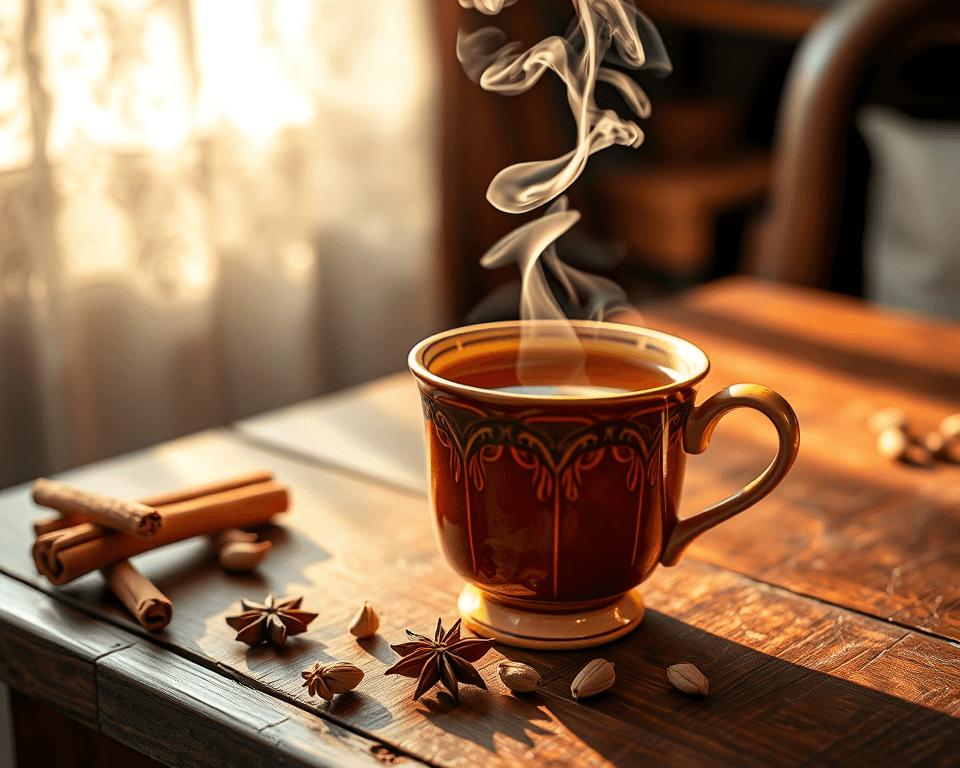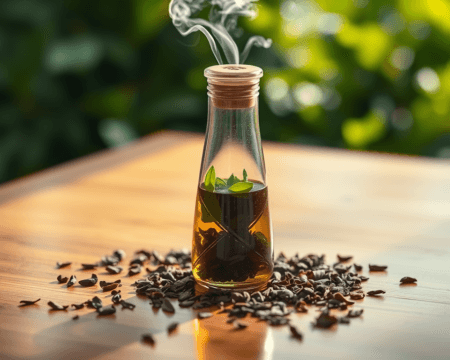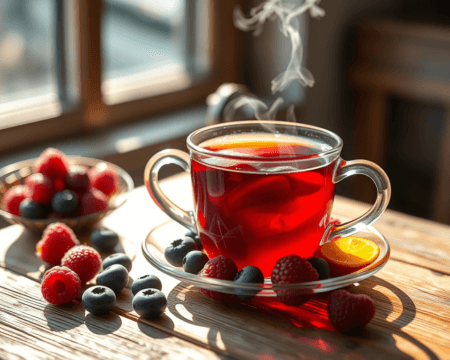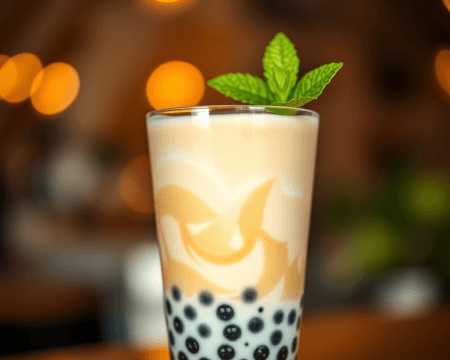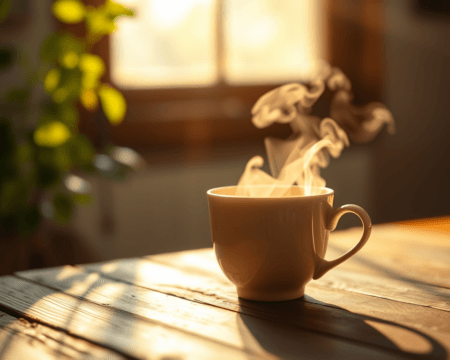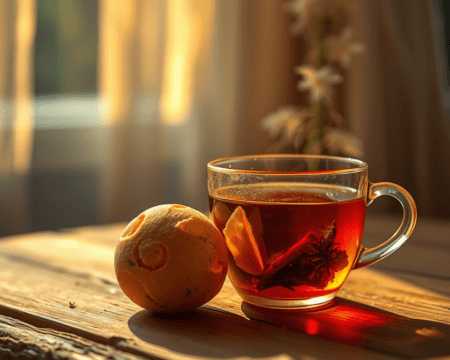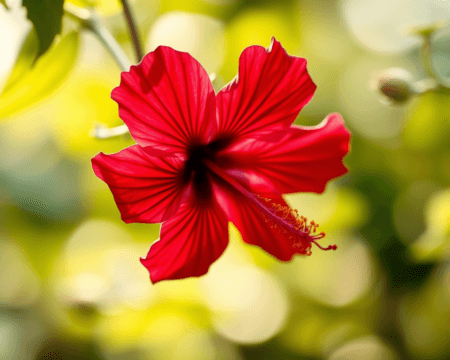If you’ve ever sat down for a soothing cup of chai or a refreshing glass of iced tea, you might be wondering: does Indian tea pack a caffeine punch? Spoiler alert: it absolutely can! But the caffeine content varies significantly depending on the type of tea. By the end of this post, you’ll be armed with insights into caffeine, its effects, and what all this means for your favorite brews.
Key Takeaways
- Indian teas vary in caffeine content, with black tea typically having the highest levels.
- Green teas have less caffeine, while herbal teas are usually caffeine-free.
- Understanding caffeine’s effects on health can help you make informed choices about your tea consumption.
- Cultural practices in India have shaped how tea is consumed and appreciated across different regions.
- There are plenty of delicious caffeine-free alternatives if you’re looking to cut back.
Understanding Caffeine in Indian Tea
What is Caffeine and Its Effects?
Let’s kick things off with the basics. Caffeine is a naturally occurring psychoactive substance found in various plants, including tea. It acts as a stimulant, enhancing alertness and concentration while warding off fatigue. You’ve probably felt its effects after that first sip—your mind clears, and suddenly, you’re ready to tackle the day.
But caffeine isn’t just about staying awake; it has health implications too. Studies suggest that moderate caffeine intake can offer benefits like improved cognitive function and even a lower risk of certain diseases. However, it’s essential to be mindful of how much caffeine you consume, as excessive intake can lead to anxiety, heart palpitations, or sleep disruptions.
Caffeine Content in Different Types of Indian Tea
When it comes to caffeine levels, Indian teas run the gamut. Here’s how they shake out:
Black Tea: This heavy hitter typically has the most caffeine. Varieties like Assam and Darjeeling have caffeine content ranging from 40 to 70 mg per 8-ounce cup. Assam tea tends to be on the higher end, offering a strong, robust flavor perfect for a morning boost.
Green Tea: With less caffeine than black tea, Indian green teas usually offer about 20-45 mg per 8 ounces. They’re fantastic for those who want a gentler lift without the jitters.
Herbal Tea: Here’s where it gets interesting. Most herbal teas—like chamomile or mint—are caffeine-free. They carry flavors and health benefits without that stimulating effect.
It’s crucial to understand that brewing time and temperature also influence caffeine extraction. Keep this in mind as you prepare your tea!
Caffeine Comparison: Different Types of Indian Tea
Black Tea vs. Green Tea: Caffeine Levels
For many tea drinkers, the choice comes down to black or green tea. Black tea is known for its robustness, and it usually offers that sharper, more pronounced caffeine kick. Brewing techniques can also affect caffeine extraction; longer steeping times yield more caffeine.
On the other hand, green tea is often lauded for its health benefits and lower caffeine content. If you’re into lighter flavors and less caffeine, this one’s your jam. You get the gentle stimulation without the racing heart.
Other Indian Tea Varieties’ Caffeine Content
Let’s not forget about the other fantastic Indian teas. For example, oolong tea typically contains a moderate amount of caffeine—about 30-50 mg per cup, depending on how it’s prepared.
Then there’s masala chai, a beloved favorite. Traditional recipes vary, but the caffeine level can be similar to black tea depending on its base. It’s delightful, spicy, and loaded with flavor while keeping that caffeine concept alive.
If you’re exploring less caffeinated options, regional favorites or specialty teas often less known could be your ticket. Remember, all those fragrant spices in chai impact its overall effect as well, including how caffeine interacts with your body.
Health Effects of Caffeine Consumption
Pros and Cons of Caffeine Intake
So, what to make of caffeine? It can be a double-edged sword. On one hand, health benefits such as improved heart health, heightened brain function, and a possible reduced risk of diseases like Parkinson’s have come up in studies. We’re talking good stuff here.
But let’s not sugarcoat it—there are side effects to watch for too. Some folks might deal with caffeine sensitivity, experiencing symptoms like insomnia or anxiety. It’s vital to listen to your body and moderate your intake if you start feeling jittery or anxious. Generally, up to 400 mg of caffeine per day is deemed safe for most adults, which translates to about four 8-ounce cups of coffee, or around six cups of black tea.
Cultural Perspectives on Caffeine in Indian Teas
In India, tea isn’t just a beverage; it’s a cultural institution. Each region has its rituals and specialties. For example, in Assam, you might find folks brewing strong black tea to kickstart their mornings, while in Darjeeling, lighter green teas take center stage in their afternoon tea culture.
Tea-drinking rituals often serve as social connectors. Family and friends gather around a steaming pot of chai to chat, share stories, and bond over flavors that hold parts of their heritage. Each region brings a unique flavor profile along with varying caffeine levels, reflecting historical influences and local preferences.
Alternative Teas: Caffeine-Free Options
Popular Caffeine-Free Herbal Teas in India
If you’re looking to cut out caffeine completely, there’s a treasure trove of herbal teas to explore. Chamomile tea? Perfect for winding down after a long day. Ginger tea? It’s not just delicious; it’s renowned for its digestive benefits and warmth.
- Mint tea is refreshing and offers a cool zesty kick, great for hot afternoons.
- Hibiscus tea is another treat, tangy and full of antioxidants, plus it’s naturally caffeine-free.
These herbal goodies help you enjoy your tea ritual without the caffeine jitters.
DIY Caffeine-Free Tea Recipes
Feeling adventurous? Crafting your own caffeine-free tea blends is a game-changer! Just toss in your favorites—dried ginger, mint leaves, and maybe a splash of lemon for zing—and let the flavors steep.
Want to customize it? Try making a refreshing spiced herbal mix with cinnamon, cardamom, and cloves. Simply simmer in water for 10-15 minutes, strain, enjoy, and pat yourself on the back for choosing a healthy option over soda or coffee!
At the end of the day, the tea choices you make can vastly impact your caffeine intake and overall health. Understanding what’s in your cup is key to balancing enjoyment with wellness. So grab your favorite mug, fill it with the brew you love (caffeinated or not), and savor every sip—not just for the flavor, but for the entire experience it brings!
Frequently Asked Questions
What types of teas have the highest caffeine content?
Black teas generally contain the highest caffeine levels among the various types of tea, often ranging between 40 to 70 milligrams per cup. Green teas have lower caffeine content, typically between 20 to 45 milligrams, while white teas and oolong teas fall in between.
Are there any health benefits to consuming caffeine in tea?
Moderate caffeine consumption can enhance alertness and improve focus. Additionally, tea, particularly green tea, is rich in antioxidants which may support heart health and reduce the risk of certain diseases.
How can I reduce caffeine intake while enjoying tea?
To cut back on caffeine, consider switching to herbal teas, which are usually caffeine-free, or choosing white or green teas, which have lower levels of caffeine. You can also steep black tea for a shorter time to reduce its caffeine extraction.
Does the caffeine content in tea vary by brand?
Yes, the caffeine content can vary significantly by brand and type of tea. It’s essential to check packaging or brand websites for specific information about the caffeine levels in their teas.
What are some popular caffeine-free alternatives to traditional tea?
Popular caffeine-free alternatives include herbal teas such as chamomile, rooibos, and peppermint. These offer a range of flavors and potential health benefits without the caffeine.
Can tea consumption affect sleep quality?
Yes, consuming high-caffeine teas later in the day can disrupt sleep patterns. To promote better sleep, it’s advisable to switch to herbal or decaffeinated teas in the evening.
How does the preparation method impact tea’s caffeine content?
The method of preparation—such as the type of tea leaves used, the water temperature, and the steeping time—can significantly affect caffeine extraction. Longer steeping times and hotter water typically increase caffeine levels.
Are there age-related considerations when consuming caffeinated tea?
Yes, individuals, particularly children and those sensitive to caffeine, should limit their intake. Pregnant women are also advised to monitor their caffeine consumption as high levels can affect fetal development.
What role do cultural practices play in tea consumption in India?
Cultural practices in India, including tea ceremonies and local preferences, significantly influence tea types consumed, preparation methods, and the times of day tea is enjoyed, enriching the overall tea experience.




